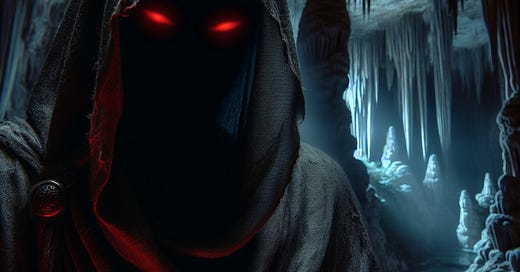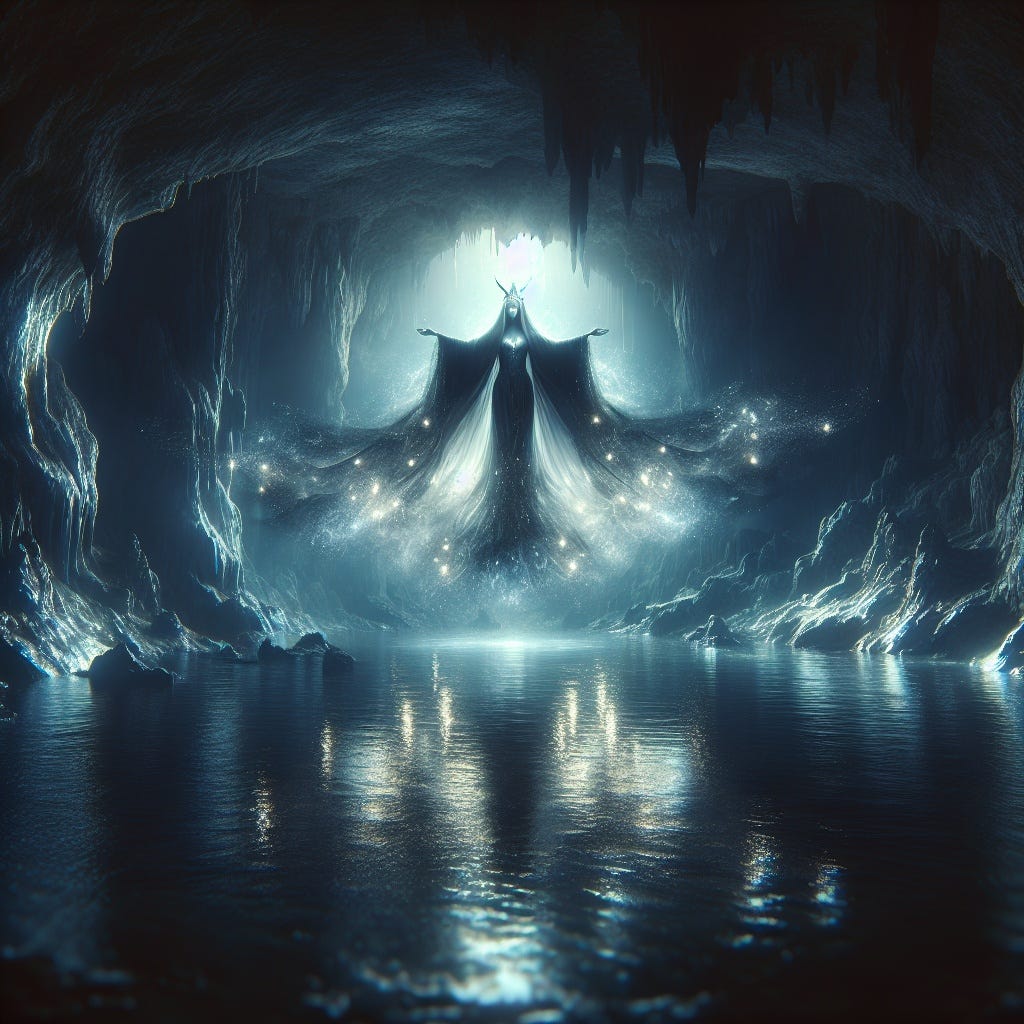(Need other parts of the story? Just click the button below, and you can see all of them, with the most recent on top.)
Time had little meaning for Menippus. He knew it must be passing, but he no longer had any sense of how fast. Had he spent days on the riverbank with Acheron? Months? Years?
“Be patient!” said Acheron in a deep voice that demanded obedience. “No mortal soul has ever bathed in my waters to wash away its mortality and become a god. There is no way of knowing how long it will take to complete your evolution.
“You can’t do much in a bodiless state. You must first manifest a body worthy of a god. Then—and only then—will it be safe for you to continue your quest for vengeance against the gods.”
“And for Empusa,” said Menippus.
Acheron’s horned head was out of the water far enough to reveal his red eyes and pale, sun-deprived skin. He shrugged, causing his entire river to ripple. “And her, of course. But for her to be impressed by you, you must have your revenge first.”
Menippus thought Acheron wrong on so many counts. Bathing in the river was such a understated way to talk about submerging in what might as well have been acid until every part of him had burned and he had screamed loudly enough to cause the nearby dead to quake with fear.
As far as getting revenge on the gods was concerned, he did feel that desire, but it was like a shadow compared to his fervent desire for Empusa. Acheron had to keep reminding him about revenge, but never about love.
However, Menippus didn’t ever argue with Acheron. However painful the process had been, Acheron had found a way to make the former scholar more than human. Without that gift, Menippus would have had no way of reuniting with Empusa.
When at last Menippus did begin to manifest a body, it was not what he had expected. After all, his divine ancestor was Eros. It was the divine spark from the god of love that the waters of Acheron had freed from the Menippus’s human soul.
The former scholar wouldn’t have admitted this to Acheron, but he had dreamed of a handsome face, perfect body, and golden wings.
Instead, what formed around Menippus’s divine spark was dark and shadowy—more like Death than Love. And in his otherwise indistinct face, two red eyes burned—eyes just like those of Acheron himself.
“I didn’t expect…this,” said Menippus, gesturing at his shadowy self. Acheron gazed at him, and his red eyes blazed more brightly.
“Eros is within you,” said the river god. “But remember, it was my water in which you bathed. My water, which has flowed through the Underworld for untold millenniums. And when it seemed you might perish, it was my power, drawn from Sun and Earth, my parents, that saved you. You now have many divine ancestors rather than just one. You are linked to Gaia, to Helios, to all the gods of the Underworld—and to me as well.
“Just as Dionysus was changed by being brought to term in the thigh of Zeus after the wine god’s mortal mother perished in flames, so now you, brought to term through my power after your mortal part dissolved, have been changed as well.”
Menippus did his best not to look disappointed. He was grateful to Acheron for giving me a chance to unite with Empusa. But he had imagined himself beautiful enough to inspire sculptors and poets. Instead, he was frightful enough to terrify young children.
As if the river god could read his mind, Acheron said, “Empusa may value young and handsome mortals, but only for their flesh and blood. In this form, she will love your soul. That is what you wanted, is it not?”
“You are sure she will find this form appealing?” I asked.
“Far more than the form of your ancestor. Remember, Empusa is a creature of the Underworld herself. Is she not more likely to be drawn to a fellow Underworld denizen than to some celestial light bringer? How could it be otherwise?”
Menippus nodded, though he wasn’t convinced. But soon enough, he would find out for himself.
“You told me before that when I was ready, primal Eros, the power source of my ancestor, would help me.”
“So I did, but even as a god, your way to him will not be easy.”
“Can you guide me?” asked Menippus.
Acheron blinked at him for a moment. “Sadly, I cannot stray too far from the river. But listen to me carefully, and I will tell you all I can.”
Menippus did as he was told, though Acheron’s directions were almost unbearably long. When the river god was at last done, he wished Menippus well and disappeared back into the water. Much as the former scholar had longed to get started, the river’s god’s rapid departure left a feeling of emptiness behind, as if all those divine influences had cancelled each other out, leaving only an echo of his destroyed humanity behind.
Fortunately, the feeling passed. Empusa was still around, perhaps even in the Underworld. But he wasn’t going to find her sitting by the river feeling sorry for himself.
Following the river god’s instructions, Menippus dived into the water. But this time, since he had absorbed some of Acheron’s nature, the river no longer burned him. As long as he stayed in it, Acheron had assured him that he would be more or less invisible to any gods who happened to be nearby. They would all see him as part of the river unless they looked very carefully.
“Just do not let them get too close,” Acheron had said. “Particularly not Charon, for he knows the river like the back of his hand. He will surely notice you if you are not careful.”
Menippus drifted along in the current, watching nervously for Charon. It did not take him long to see the ancient ferry, whose wood should long since have rotted away had it not been the work of the gods. The ferryman was on his way back from delivering some of the dead to the river’s far shore.
Menippus could submerge again, swim close to the riverbank from which Charon had departed, and avoid him completely. Curiosity got the better of Menippus, though. Or perhaps the instincts of the scholar he had once been had not died completely. Either way, how could resist the opportunity to get a glimpse at the ferryman of the dead?
Superficially, Charon looked like a beggar on the verge of death. His face, pale and bloodless, was so thin that, from a distance, it could be mistaken for a skull despite the unruly white beard that grew from his chin. His body, almost skeletal, was clothed in filthy rags.
But even from a distance, Menippus could feel the ferryman’s power, cold as ice and hard as stone. River gods were powerful, but the former scholar doubted that Acheron could beat Charon in a fight.
That shouldn’t have surprised anyone, least of all, someone as well read as Menippus. Charon had been born in utter darkness from the coupling of Night and Erebus when the universe was young. That made him older than Hades, older even than Hecate, the triple goddess who knew magic even better than Hermes and had walked the earth when titans ruled it.
No wonder Acheron had warned Menippus to avoid the ferryman. But the former scholar gazed too long. Charon, sensing a slight irregularity in the river, looked in Menippus’s direction and saw him. Had Menippus still been mortal, the ferryman’s intense stare would have sent him screaming in the other direction. As it was, a chill ran through his entire body, and he shuddered.
“You there!” Charon’s voice sounded like a dying man drawing his last breath—except that it loud enough to echo over and over. “You don’t belong here!”
Menippus did as Acheron had taught him and made himself invisible. But Charon, who already knew he was there, steered the ferry in his direction. Menippus was forced to dive down to the river bottom and try to hide himself in the mud.
In theory, Charon should not have been able to follow him. Acheron might be imprisoned in the Underworld, but he still had some control of his own river. Other gods didn’t normally trespass in a river god’s domain without grave reason.
Unfortunately, Charon was also a relentless enforcer of the rules, and he knew an aberration when he saw one. Menippus’s blood ran cold when he saw Charon sliding down through the water as if he ruled the river himself.
Menippus swam as fast as he could back the way he had come, but Charon was both far faster and far stronger than he looked. The moment he hit the river bottom, he ran after the former scholar as if the ferryman were Hermes flying through the air. If the river current affected him at all, the effect was too small to see.
“Help me!” yelled Menippus. Since he was a god and now connected to the river as much as to its lord, he hoped his voice would carry back to Acheron. The river god had said he couldn’t help if Menippus ran into one of the Underworld gods, but who knew what he might do if Menippus was in danger of capture.
Charon grabbed his foot with hands as cold as icicles and started to reel him in like a fish. Menippus had no idea what the ferryman would do once he had drawn him closer. Nor did he want to find out. But Charon’s grip was unyielding, no matter how much Menippus struggled.
The ferryman gripped him with arms like steel and pulled him back to the surface. Even though Menippus was now technically a god, he must have been a minor one at best, certainly no match for an elder power.
However, Acheron had taught him one trick that might work. Acheron had gifted him a slight connection to Helios, and he used that to create a momentary burst of sunlight.
Charon could not be overcome by such minor magic. But it did surprise him, for even he couldn’t remember the last time he had seen the sun. He relaxed his grip on Menippus, who broke free, kicked him in the face, and swam away as fast as he could.
That turned out to be faster than he expected. The river water itself felt as if it was pushing him ahead, speeding him beyond how fast even Charon could move.
Was Acheron doing that, or was Menippus doing it himself? He really didn’t care as long as he could maintain the momentum.
Charon pursued him for a while but then tried a different strategy. He shot to the surface and began yelling loudly for aid. In response, Cerberus’s three heads growled, the snakes that wreathed those three heads hissed, and the Underworld watchdog trotted to the water’s edge, where he snarled and drooled poison into the water. He didn’t seem able to cross, but he effectively blocked Menippus from exiting the river on that side.
Meanwhile, Charon moved out of the water on the side where the dead stood, blocking Menippus from exiting on the the other side.
Menippus could try to swim back to Acheron, but that would get him no closer to his goal—and now Charon and Cerberus would both be watching for him. His only other option was to keep swimming. Despite how shaky he felt, he tried to remember what Acheron had told him about Underworld geography.
Beyond the beach where Cerberus growled and snarled, the Acheron River split into two branches. The one flowing to the west became Lethe, the river of forgetfulness, but if he took that route, he might lose his memory, even though he was a god. That was unfortunate, because Lethe’s course took it near where Menippus could find the Cave of Night. But if he got there with no memory, he would have gained nothing.
The western branch of the Acheron split again, flowing into both Styx, river of hate, and Phlegethon, river of fire. The latter flowed down into Tartarus, the place where the worst and most dangerous offenders against the gods were punished, If he ended up down there, he’d likely be trapped. If he followed the Styx, he had to avoid the point at which Cocytus, river of lamentations, split off from the Styx, because Cocytus also led to Tartarus. But if he followed the Styx far enough, he would eventually reach a point similar to where the Lethe ended—near the Cave of Night, his objective.
An overland route might have been easier, but the river route was at least possible. With that in mind, Menippus swam as fast as he could to the west. Cerberus barked loudly enough to start an earthquake, but he still didn’t enter the water. However, Charon swam over to the ferry and climbed in. From the way he glared at Menippus, it was clear the ferryman intended to follow him.
Menippus swam as if his life depended on it. He doubted Charon could kill him, but he could at least be mangled, perhaps imprisoned. Either way, he would lose his chance to be with Empusa. He’d had the advantage that no one except Acheron knew he existed. He would never have that again. If he didn’t stay free now, he’d likely never regain his freedom.
Menippus’s new body didn’t seem to tire easily, and he swam as if he were a river god. But his heart beat faster as he realized that Charon was gaining on him. It appeared that Charon’s ferry had a magic of its own, With his newly sharpened hearing, Menippus could hear it gliding through the water the way a bird glides through air.
The former scholar tried to will himself to go faster, and once again, he felt invisible hands pushing him forward. Even with the extra push, all he accomplished was slowing the rate at which Charon caught up with him. He could feel the implacable will of his pursuer, the determination to make Menippus obey the unwritten rules of the Underworld.
The river’s course curved a little, and Menippus gasped when he saw a figure floating above the Acheron.
The woman—no, goddess—had a face that could have passed for Aphrodite’s, but it was framed by long hair, dark as Empusa’s. The expression was also cold and every bit as unyielding as Charon’s. Her eyes gleamed like stars, and a faint glow like moonlight surrounded her.
She was too dark to be Persephone, but the power Menippus could feel radiating from her was too great for her to be some minor goddess.
That left only one possibility—she was Hecate, to whom Zeus gave power in air, earth, and sea, goddess of witchcraft, mistress of Underworld magic, slayer of giants.
“What have we here?” she asked, her voice soft as a evening breeze but cold as the a winter midnight.
“An intruder!” yelled Charon from behind him.
Hecate squinted at him, and her eyes dimmed for a moment. “Curious. You were once mortal, but you now seem to be a god. How did such a transformation come about? Zeus did not authorize it, or we would have heard.”
“God or not, he does not have Hades’s permission to be here,” said Charon.
Hecate shook her head disapprovingly. “Doubly a lawbreaker then. You are guilty of both hubris and trespassing. What shall we do with you?”
Menippus wanted to say something in his own defense, but his mouth felt as if it had been sealed with ice, and he couldn’t speak.
“Imprison him!” demanded Charon. “Imprison him forever in Tartarus, for he must surely be a rebel god.”
Hecate nodded and gave him a smile as cold as a glacier. “As he is immortal, let his sentence be eternal.”
Menippus would have wept then, but his eyes seemed as frozen as his mouth. He could neither plea for cry out.
In that soul-freezing moment, he knew one thing for sure.
He would never see Empusa again.
Did you know I’ve also written novelizations of some Greek myths? Click the button images below for more information.










Love those pictures